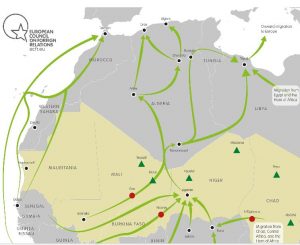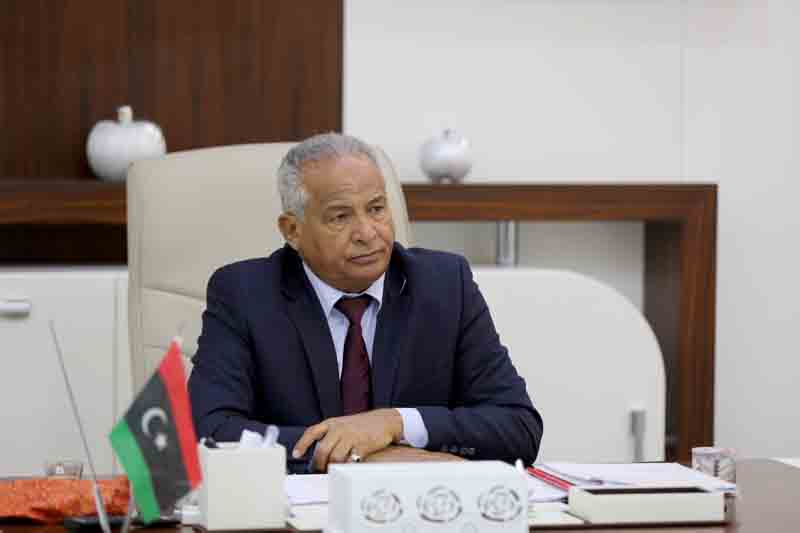By Libya Herald reporter.

London, 24 July 2017:
A policy paper by the European Council for Foreign Relations (ECFR) published last week says that international policies in the Sahel region fail to adequately address the reasons why migration occurs. The paper says that the chaos in Libya is exacerbating lawlessness and crime in the Sahel and that the continuation of Qaddafi-era smuggling of Libyan subsidised goods such as fuel is thriving and acting as seed capital for criminal activity in broader trade in weapons, drugs, and people.
The study says that global interest in the Sahel has expanded significantly in recent years and that the growth of regional terrorism, the collapse of Malian State in 2012, and the migration crisis after 2014 all mean that world must think about the Sahel. Yet despite the newfound attention to the region, regional and international efforts to resolve these crises remain inadequate.
It states that region-wide strategies and coordination forums have proliferated, and international money has poured into the region. But these strategies remain security-focused despite emphasising the need for improved governance. Informal economies and corruption continue to sap states of needed resources. And overly securitised efforts by the European Union to reduce migration to Europe damage border communities, undermine regional populations, and fail to adequately address the reasons why migration occurs.
The policy paper proposes a more holistic approach to regional stabilisation, one that acknowledges the need for better security capacity and coordination while also emphasising the need for greater regional integration between North Africa and the Sahel. This approach can help limit the appeal of operating in the informal sector while providing opportunities for legal work in the Sahel. The formalisation of some previously illicit or clandestine economic activity can, in turn, improve development and economic diversification in the Maghreb while providing labour opportunities for the region.
To accomplish these goals, the paper proposes that French and international efforts to improve intra-Sahel and Sahel-Maghreb integration focus on migration, economic reform, security coordination, and regional institutional frameworks.
Addressing migration issues involves creating a joint migration framework for the Sahel, West Africa, and the Maghreb. The EU should assist these countries to regularise and legalise population flows. The EU should also provide financing for regional economic projects, leave room for some legal migration to Europe and reduce pressure on local governments to crackdown on border communities.
Regional economic reform requires developing an approach to migration and informal economies that encompasses the Sahel and the Maghreb, while also encouraging outside investment by regional states as well as the international community.
Better security coordination involves a focus on long-term security sector reform beyond basic training for troops in countries like Mali and a better integration of security and governance initiatives to make security gains durable and sustainable.
Finally, improving regional institutions entails harmonising and strengthening regional coordinating bodies to help reduce dependence on international support.
With regards to Libya, the paper says that the anarchy in Libya continues to create new political and security challenges. The spread of the so-called Islamic State (ISIS) into Libya introduced a new element of instability. The movement of its fighters to other parts of North Africa and the Sahel, especially after its defeat in Libya, may further fuel regional instability. Libya’s chaos is also exacerbating lawlessness and crime. Smuggling is thriving, fed by the continuation of Qaddafi-era subsidies. Smugglers, for example, capitalise on illicit sales of subsidised petrol to generate seed money for a broader trade in weapons, drugs, and people.
The threats emanating from Libya propelled improved security coordination between Algeria and Tunisia, including the establishment of a joint operations centre to respond to regional violence and jihadist infiltration. If the situation in Libya stabilises, opportunities exist to improve its integration within the Maghreb and the Sahel. Libyans already are working − albeit through competing government structures in Tripoli and Beyda − to strengthen their ties with the Sahel. General Khalifa Haftar, for example, is seeking closer political cooperation with both Chad and Niger. A reasonably stable Libya could use its $67 billion sovereign wealth fund for investments in the region.
In conclusion, the policy paper makes the following recommendations:
- Develop a joint framework on migration among the countries of the Sahel, the broader West African region, and the Maghreb.
- Help countries in the region to regularise population flows.
- Increase investment in regional economic projects using the EU Trust Fund for Africa and the European External Investment Plan.
- Encourage increased investment in the Sahel, especially from the Maghreb.
- Streamline regional security cooperation and encourage security sector reform.
- Harmonise regional coordinating bodies and formats to improve efficiency.
- Rationalise international efforts through better coordination and streamlining.








